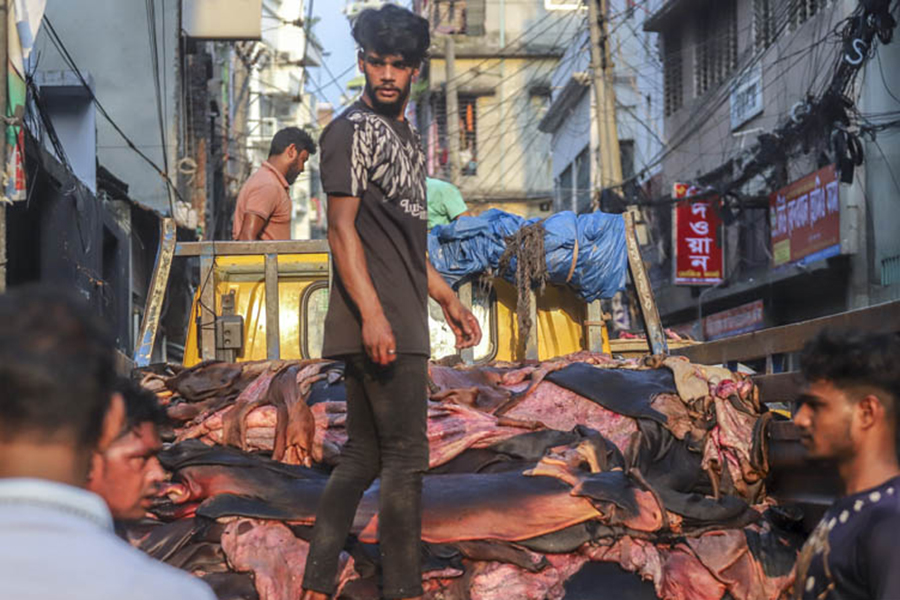
Published :
Updated :

Rubel, a seasonal trader from Dhaka’s Konapara who goes by a single name, purchased 240 sacrificial cowhides this Eid-ul-Adha, encouraged by the government’s announcement of increased prices.
But by Saturday night, his optimism had turned to dismay.
Speaking to bdnews24.com at Posta around 8:00pm, Rubel said wholesalers were offering just Tk 650–700 for hides that fetched Tk 800–900 last year.
“It feels like we’ve been trapped by a syndicate,” he said.
By 11:30pm, Rubel reported that he had managed to sell the fresh hides from large cows for Tk 700 each. Skins with minor defects or from sick animals sold for as low as Tk 140.
“I estimate a loss of Tk 70,000 to Tk 80,000 after factoring in transport and labour. I haven’t even had the energy to calculate the exact figure,” he added, visibly disheartened.
About half of the total animals slaughtered in Bangladesh throughout the year are sacrificed during Eid-ul-Adha. Seasonal traders buy rawhides from those who perform the ritual sacrifice and then sell them to wholesalers.
The wholesalers apply salt and carry out the initial preservation, after which the animal skins are sold to tanneries.
Each year, the commerce ministry sets the prices at which tanneries buy rawhides.
Faisal, a teacher who also gave a single name from Talimul Quran Madrasa in Lalbagh’s Shahidnagar, came to Posta to sell 16 cowhides received as donations.
He told bdnews24.com, “According to the government-fixed rate, each hide should be priced between Tk 1,500 and Tk 2,000. But the wholesalers are offering an average of Tk 400 for all of them. One person offered Tk 600, so I’m thinking of selling them.”
The government-fixed price for purchasing sacrificial animal skins this year has increased by Tk 5 for cowhide and Tk 2 for goatskin compared with last year.
This year, tanners in the capital will be able to purchase salt-cured cowhide at Tk 60-65 per sqft, up from last year's rate at Tk 55-60.
Outside Dhaka, the price of salt-cured cowhide has been set at Tk 55-60 a sqft, compared with last year's Tk 50-55.
Tanners buy salt-cured rawhides from wholesalers per square foot whereas wholesalers and middlemen usually collect them over an average estimation.
Abu Hanif, who arrived from Demra with 40 rawhides, said: “The skins I bought for Tk 650, 700, or even more than Tk 800—here they are offering just Tk 700. The truck fare and labour costs will be a loss, not to mention the hard work all day.”
He feared that prices might fall even further as time passed.
Although wholesalers and middlemen buy rawhides based on average size, tanners purchase salt-cured skins by square foot. A medium-sized cattle typically yields 20 to 25 sqft of hide.
At Posta, rawhides are bought, salted and then sold to tanneries. This process requires the wholesalers to pay for salt and labour.
However, Hanif couldn’t understand how this justifies cutting the price in half than the government-fixed rates.
The Demra resident said, “Even though square footage is calculated using both length and width, here in Posta, wholesalers are quoting prices based only on length. Based on that, the price per sq ft of rawhide comes to just Tk 30–35.”
Meanwhile, several wholesalers claimed they were purchasing rawhides in line with government-fixed rates.
Abdur Rahman, a partner at Nawab Mansion, told bdnews24.com: “We’re paying based on the quality of the rawhides—buying them at Tk 700-1,000. Excluding the cost of applying salt, we are following the government-fixed prices.”
However, an on-site visit revealed that small to medium-sized cowhides were being sold for Tk 200-400. If there were holes, the price dropped to Tk 50–100. Large cowhides were being sold for Tk 400-700.
Wholesaler Abdus Salam Khokon told bdnews24.com that he is buying large cowhides for Tk 400-650, medium ones for Tk 350–400 and small ones for Tk 200.
He was asked why salt-cured rawhides are being purchased without aligning with the government-fixed prices.
He responded that the wholesalers are compelled to maintain the prices offered by the tanneries.
“If tanneries buy salted rawhides from us at government-fixed rates, we will also offer those prices,” he added.
Alif, in charge of discipline on behalf of Posta’s rawhide management committee who gave a single name—and also buying hides—said: “Compared with the past 3–4 years, prices are lower this year.
“The open and fair trading we saw before isn’t happening now. It feels like there’s a syndicate at play.”
Abdur Rahman, partner at Nawab Mansion, stressed that fewer hides are arriving at Posta this year.
“Most wholesalers have moved to Savar’s Hemayetpur, so the rawhide market has become divided,” he said.
The caretaker administration distributed 30,000 tonnes of salt free of cost across the country to ensure orphanages and madrasas get a fair price for Eid-ul-Adha rawhides, alongside the export of raw and “wet blue” rawhides.
Many wholesalers believe this has prompted some to process the rawhide themselves rather than sell them to the market.


 For all latest news, follow The Financial Express Google News channel.
For all latest news, follow The Financial Express Google News channel.